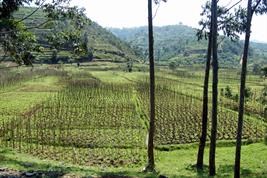06.04.2023

The German Research Foundation (DFG) has now announced the funding of new research groups. The research group "A social-ecological systems approach to ecosystem restoration in rural Africa" has also been included in the funding. More than three million euros will be available for this project over the next four years. The Leuphana University of Lüneburg, the Humboldt Universität zu Berlin, the University of Göttingen and the Leibniz Centre for Agricultural Landscape Research (ZALF) are involved in the project. The spokesperson of the research group is the expert on sustainable land use, Prof. Dr. Jörn Fischer from Leuphana.
"Ecosystem restoration has become a global priority in the face of climate change, biodiversity loss and soil degradation," says Jörn Fischer, describing the starting point for the project now being funded. In this context, he refers to numerous global initiatives that are trying to promote the restoration of ecosystems: One of them, the Bonn Challenge, for example, aims to restore 350 million hectares of land by 2030.
However, the ecological, social and socio-ecological consequences of major renaturation initiatives are still poorly understood. That is why the researchers in their project are interested in understanding the extent to which different approaches are actually successful in restoring biodiversity. They are also looking at social consequences, for example for community cohesion or the emergence of social injustice. So far, little is known about these social-ecological relationships.
Specifically, the research group will focus on ecosystem restoration in western Rwanda in eight subprojects. Ecosystems are being restored at various locations throughout the country by planting trees. The scientists want to investigate the resulting changes, for example, in the composition of woody vegetation, landscape context and ultimately biodiversity. Part of the research will involve using satellite data to identify and analyze landscape changes over the past decades. Particular attention will be paid to the connectivity factor, as good connectivity between sites has a positive influence on biodiversity. Two subprojects are embedded in the working group "Sustainable Land Use in Developing Countries (SusLAND)" at ZALF under the leadership of Stefan Sieber.
Another perspective, however, is the complex relationship between ecosystems and people. Social-ecological research, in which ZALF is involved with a sub-project led by Dr. Katharina Löhr, looks, for example, at the influence of renaturation initiatives on local communities and their social cohesion. This involves recognition, respect and the inclusion of identity, culture and traditional ties of the local population to the land as well as the way in which communities are involved in decision-making related to restoration.
In addition, ZALF is involved in a sub-project on so-called "Living Labs". In this subproject by Dr. Stefan Sieber (ZALF) and Prof. Dr. Vicky Temperton (Leuphana University of Lüneburg), new approaches to ecosystem restoration are being tested in collaboration with local actors in two communities that act as real laboratories. The subproject aims to increase social and ecological impacts beyond the status quo.
"The research group will break new scientific ground both in Germany and internationally, creating enormous added value beyond what could be achieved by separate research projects," Professor Fischer is convinced.
Background:
Research groups enable scientists to address current and pressing issues in their fields and to establish innovative lines of work. In total, the DFG currently funds 182 research groups, 12 clinical research groups and 17 collegiate research groups.
Further information:
Within the framework of the research group, several PhD positions and one post-doctoral position will be announced in the near future. More information in the announcement:
 Announcement: A social-ecological systems approach to inform ecosystem restoration in rural Africa
Announcement: A social-ecological systems approach to inform ecosystem restoration in rural Africa
